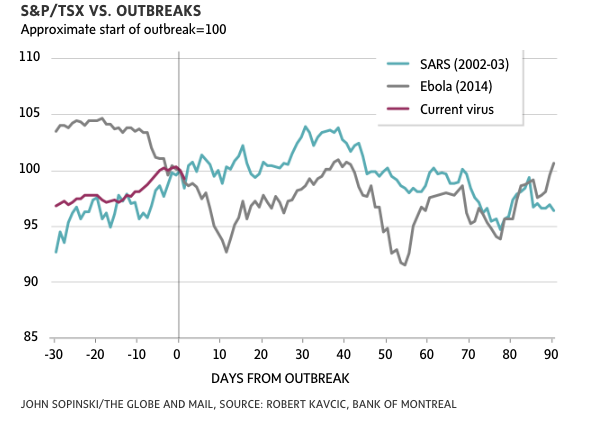
TIM SHUFELT
Feb. 1, 2020
The stock market, rarely a bastion of calm in a crisis, was unusually resilient in January to the emerging threat of a global pandemic – until Friday.
A day after the World Health Organization (WHO) declared the novel coronavirus outbreak a global emergency, the continuing spread of infections around the world overwhelmed the market’s resolve, sending benchmark indexes deep into the red. The S&P 500 index had its worst trading day since October with a decline of 1.8 per cent, while the S&P/TSX Composite Index fell by nearly 1 per cent.
Periods of heightened volatility are common in the early days of an outbreak, judging by the way other epidemics, such as severe acute respiratory syndrome (SARS), rippled through financial markets.
That track record of health emergencies also suggests stock-market losses are typically fleeting – sell-offs that can last as little as three weeks.

“We’ve learned how these things play out,” said Robert Lauzon, deputy chief investment officer at Middlefield Group. “This is probably going to be just another panic attack that amounts to a buying opportunity.”
Back in 2003, the best time to buy into the Canadian stock market would have been March 12 – the day the WHO issued a global alert for a severe form of pneumonia that would soon be called SARS.
By the time the alarm was raised, the prices of Canadian equities had already hit bottom.

The declaration of a health emergency has been a lagging indicator in other outbreaks as well, according to a report by Florida-based Ned Davis Research Inc., which looked at market performance during episodes such as SARS, the avian flu epidemic in 2004, two Ebola outbreaks in Africa in 2014 and 2019, and the Zika virus in 2016.
“On average, the bad news has been priced into the market in the months leading to the WHO announcement,” the report said.
For many Canadian investors, SARS looms large, because Toronto became the Western focal point of the illness.
“It was the first time we really had to dig into viruses as something we had to worry about as part of our investment risk,” Mr. Lauzon said. A kind of outbreak playbook for investors emerged that for the most part applied in subsequent global health scares, including the current coronavirus epidemic, so far.
First and most severely hit in the early days of an outbreak are stocks of companies related to tourism in the affected areas – airlines, casinos, luxury brands, and hotels. Royal Caribbean Cruises Ltd.’s stock is down by 13 per cent over the past two weeks, Wynn Resorts Ltd., which generates much of its revenue from casinos in Macau, is down by 17 per cent, and Air Canada shares have lost 13 per cent. (Air Canada was among the biggest-losing stocks in the SARS crisis, but it was careering toward bankruptcy at the time.)
Canadian companies that do business in China are in the second order of stock-market casualties, which was also the case in 2003. S&P/TSX Composite Index members that derive more than 10 per cent of their revenues from the Chinese market, according to calculations from FactSet Research Systems Inc., are among the worst-performing stocks of the past two weeks.
The reduction in air travel tends to weaken global demand for oil in a typical epidemic. This January and February, travel restrictions alone could reduce China’s demand by 500 million barrels a day – the equivalent of 0.5 per cent of the global total, according to S&P Global Platts Analytics. Since early January, the price of West Texas Intermediate has declined from about US$63 per barrel down to US$52, which in turn has weighed on Canadian energy stocks, down about 15 per cent over that period.
For the stock market as a whole, a survey of past epidemics suggests an average pullback of 10 per cent or less, and a full recovery in relatively short order – typically a month or two.
Since Jan. 17, when the S&P 500 last hit a record high and the U.S. Centers for Disease Control and Prevention announced enhanced health screenings for the virus at some airports, the benchmark U.S. index has lost 3.1 per cent. The S&P/TSX Composite Index is down 1.8 per cent from its most recent peak on Jan. 23. That doesn’t exactly suggest investors are in panic mode.
For the month of January, which featured a brush with war between the United States and Iran in addition to the threat of a global pandemic, the S&P 500 is merely flat, while the Canadian index is actually up.
“I’m a little surprised the response has been so tame,” said Eric Lascelles, chief economist at RBC Global Asset Management. “There’s some historical evidence that argues you shouldn’t sit on the bearish side of the fence for too long. People are looking for the bottom almost instantly after the outbreak begins.”
The recent rise in volatility should also be viewed in the context of calmly rising stock markets over the past several months. Since the end of 2018, the S&P 500 has risen by 33 per cent up to mid-January, while the Canadian benchmark index gained 23 per cent. And until the coronavirus started to rattle investor sentiment, the S&P 500 index went 71 days without moving 1 per cent in either direction.
Stocks were simply “due” for a dip, said Craig Basinger, chief investment officer at Richardson GMP. Where it all goes from here depends on whether the current epidemic follows the playbook, or proves to be something more severe, he said. “If you start to see deaths outside of China or another hotspot of transmission, that would be enough to knock out the market’s confidence.”
This Globe and Mail article was legally licensed by AdvisorStream.
© Copyright 2024 The Globe and Mail Inc. All rights reserved.


